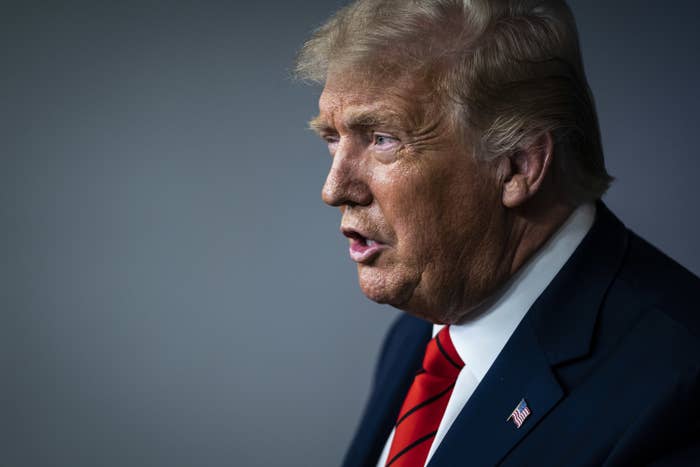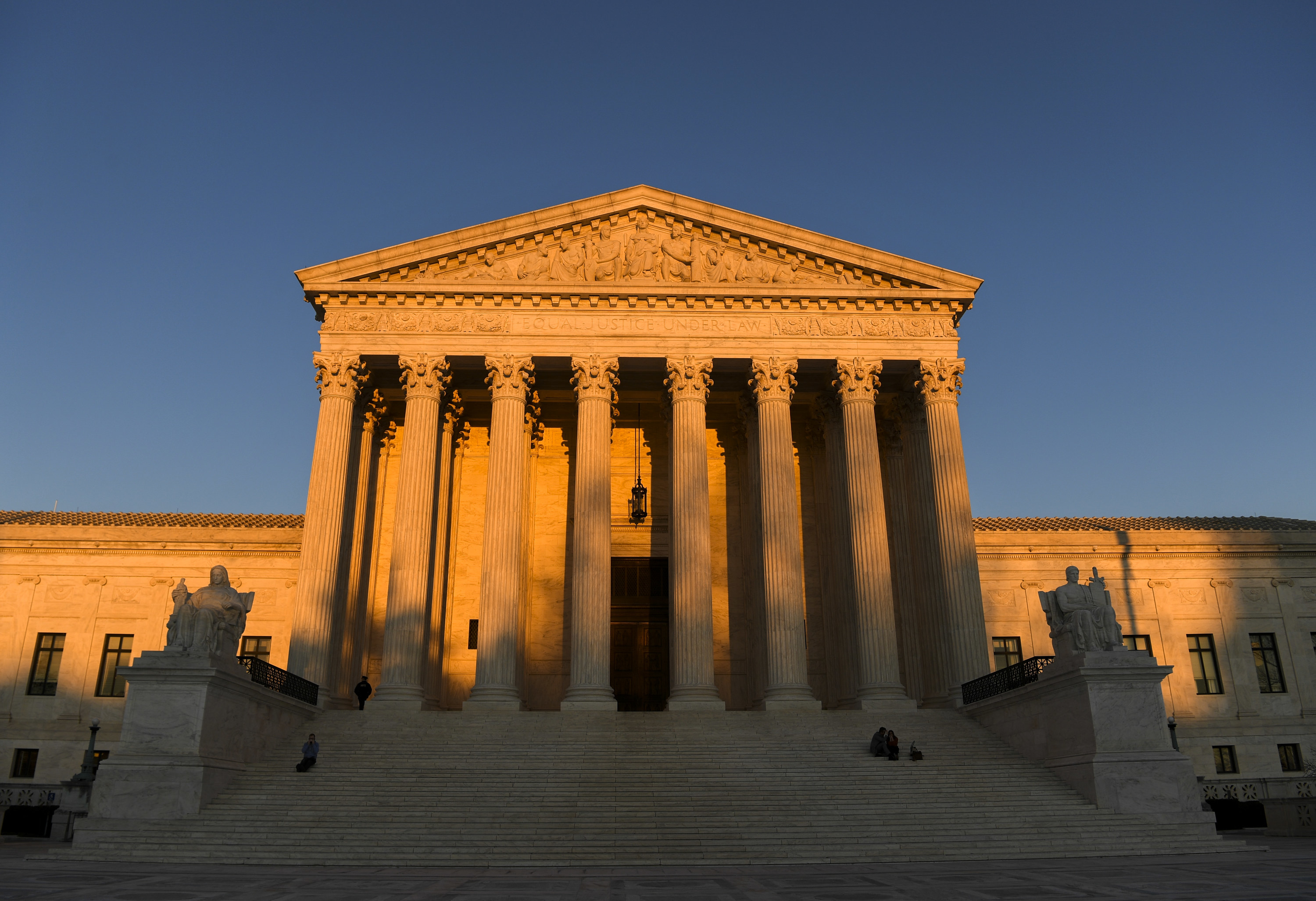Trump Cannot Just “Go” To The Supreme Court To Fight Election Results. Here’s What Would Need To Happen To End Up There.

WASHINGTON — In the early hours of Wednesday, with many states still going through the lawful process of tallying votes, President Donald Trump declared: “We will be going to the Supreme Court.”
That’s not how the courts work, though. With rare exceptions that don’t apply to the election, no one can simply bring a case to the US Supreme Court. Trump’s rhetoric created an appearance of legal uncertainty around the election results that doesn’t exist yet — by Wednesday evening, there were a handful of lawsuits pending, but none involved the kind of consequential fights over final vote tallies that would decide the outcome of the race.
That could change, of course. Trump’s campaign said they’ll seek a recount in Wisconsin after former vice president Joe Biden was declared the winner, and could try to go to court to challenge the results if he still lost after that. Decision Desk HQ called Wisconsin for Biden outright on Wednesday.
There’s already a case pending before the Supreme Court about whether Pennsylvania can count absentee ballots that arrive between Nov. 4 and Nov. 6, but that would only be a vehicle for deciding the election if the race came down to Pennsylvania’s 20 electoral votes — and if those as-yet-unknown number of post–Election Day ballots would change the outcome.
Regardless of whether the Trump campaign’s lawsuits succeed in stopping any ballots from being counted, they’ve underscored Trump and his campaign’s efforts to falsely question the lawfulness of ballot counting that extends beyond Election Day — something that happens in every election. On Wednesday, dozens of Michigan residents tried to disrupt ballot counting at a site in Detroit, spurred by fake information that spread online of widespread fraud.
Trump’s campaign filed five new legal actions on Wednesday. Two are aimed at halting ballot counting in Michigan and Pennsylvania on the grounds that the Trump campaign and Republicans haven’t gotten as much access to observe the process as they argue they’re entitled to under the law; in the Pennsylvania case, the campaign lost the first round before a judge in Philadelphia. On Election Day, the Trump campaign unsuccessfully asked the Nevada Supreme Court to stop ballot counting in Clark County on the grounds that they weren’t being given access to observe the process.
Another Trump campaign lawsuit filed Wednesday accuses Pennsylvania of giving certain first-time voters too much time to comply with an ID requirement (the campaign said they’d filed this case but hadn’t released the court filings by publication time), and the fourth seeks to join the Pennsylvania case already before the Supreme Court. Shortly before publication time on Wednesday night, the campaign filed a new lawsuit in Chatham County, Georgia, but it wasn't an effort to halt ballot counting — the campaign alleged it received information that absentee ballots that arrived after the state's Election Day deadline might be improperly mingled with valid ballots, and asked the judge to enter an order making sure none were counted.

There are two other cases pending in Pennsylvania that the Trump campaign isn’t directly involved in, although both were brought by Republicans. One is an attempt to toss out at least 93 ballots cast by absentee voters in Montgomery County who were given a chance to fix or “cure” problems with their ballots before Election Day; the other seeks to block an unknown number of absentee voters whose ballots were disqualified from casting provisional ballots instead.
With the exception of the Pennsylvania case that’s already before the Supreme Court, any new legal fight would take time to work its way through the lower courts before the Trump campaign could ask the justices to weigh in. The court also isn’t bound to take a case, although they’re likely to step in if there’s a legal question that could decide the entire election.
Bush v. Gore, the Supreme Court case that handed the presidency to George W. Bush in 2000, began with weeks of back-and-forth by Bush and then–vice president Al Gore’s campaigns over ballot recounts in Florida. Gore filed the case that would eventually land before the justices only after Florida certified its results in late November and declared Bush the winner. The court ruled on Dec. 12, 2000, more than a month after Election Day.
Trump’s comments Wednesday morning were the latest iteration of statements he’s made leading up the election predicting that the Supreme Court will play a role in deciding the presidency and pledging to fight state election practices and results that he doesn’t like before the justices.
Trump and Senate Republicans rushed to fill the late justice Ruth Bader Ginsburg’s seat after Ginsburg died in September, with Trump saying that the court needed a ninth justice in place by the election and that he was “counting on” the Supreme Court to “look at the ballots.”
If the winner of the presidential race does end up hinging on a Supreme Court decision, Trump’s comments make clear that he’s banking on the court’s conservative majority — which is now at 6–3 since the Senate confirmed his latest nominee, Justice Amy Coney Barrett — to rule in his favor. In the weeks leading up to Election Day, the court issued a mix of decisions that expanded mail-in voting opportunities in some states and limited it in others, although the court’s conservative-leaning justices have generally sided with Republican efforts to restrict Americans’ ability to vote remotely during the coronavirus pandemic.
Biden’s campaign wasn’t active in court before Election Day in the same vein as Trump’s campaign, but both the Republican and Democratic Party organizations committed millions of dollars and armies of lawyers to legal fights arising around the election this year. On a call with reporters on Wednesday, Bob Bauer, a senior adviser to Biden’s campaign and veteran election lawyer, was dismissive of Trump’s threats that they’d try to go to the Supreme Court to stop ballots from being counted after Election Day.
“If at some point he arrives before the Supreme Court with a novel proposition that ballots that were lawfully cast by eligible voters, but not yet counted by the time Donald Trump wanted them counted, that somehow they don’t count anymore, he will be in for one of the most embarrassing defeats a president ever suffered before the highest court of the land,” Bauer said.

No comments